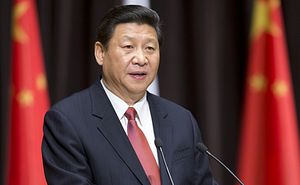Politics anywhere is often about just how good leaders can be at playing magicians. While magicians make physical things seem to appear and disappear, for politicians the magic involves sneaking ideas in and out of statements, speeches, or political discourse. These ideas assist in the speaker’s grand plans but are in danger of being killed by opponents and enemies. Some sleight of hand is needed. Politicians work their magic with the assistance of the old tools of rhetoric, obfuscation, and ambiguity. Just witness the examples from Western master practitioners, like President Bill Clinton’s comments on the Lewinsky scandal or British Prime Minister Tony Blair’s moral justifications for the 2003 intervention in Iraq, which we now see clearly as a brutal act of geopolitical realpolitik.
Deng Xiaoping was the greatest magician of modern Chinese politics. In 1978, when he addressed the Third Plenum of the Central Committee of the Communist Party, Deng never said that he intended to introduce foreign capital into China, allow the development of a market, take apart communes, and accept privately owned companies. But over the ensuing two decades, that is precisely what China did. If Deng had been explicit in his statements in 1978, perhaps opposition would have halted the whole reform and opening up process there and then. Instead, by using drearily formal party language, Deng produced remarks so abstract that at the time they barely registered. Yet these words have been able to supply political cover for innovations and changes right up to the present day.
The great trick we see in the 2013 Plenum is an amazing disappearing act. The Plenum document issued on November 16 sets out wholesome and pleasant-sounding commitments to transparent governance, grassroots democracy, and administrative reform. The document scraps labor reform camps, promises to change the Household Registration system, and offers new land rights to farmers. The message we get here is that government accountability is going to increase, that the government, like the economy, needs to modernize and be open to more efficient management. Market forces have to push not just enterprises but also governing authorities to be more capable and receptive to public concerns.
This is bold reformist language. Having government reduce its area of influence and become smaller is surely a good thing. Interfering, over-mighty bureaucrats are as detested in the Chinese system as in most other parts of the world. It’s a smart populist move for Xi Jinping and Li Keqiang to speak about reigning in the government and curtailing its ability to interfere in areas it had best keep out of.
Yet if you want to find the real winner of the 2013 Third Plenum, look no further than a single remark found a few sentences into the report. While government ministries and state-owned enterprises are being tamed, the Communist Party itself faces no such restraints. The Plenum’s report shows that the Party maintains a position as privileged and pure as it did decades ago — utterly aloof, in the dead heart of the Chinese modern firmament. The report assumes that the Party is central to the whole project of continued national development, and thus no regimes of accountability or external regulations are laid upon it. The opening preamble of the Plenum Declaration simply makes the bold and categorical statement that the Party is essential for China and that a prosperous future is possible only under its leadership. With that brief mention, that Party’s name disappears from the document.
Politically, this means that Party leaders are the real winners of the 2013 Plenum, not the government, state enterprises, or the military or security apparatus. And that means Xi Jinping walks away with the best deal. Even Premier Li Keqiang has to grapple with new constraints on his executive role in the State Council, and start to look at how to make it responsive and accountable. But the Party, and Xi, sit apart from all of this. The Third Plenum of 2013 shows us that in terms of political tactics and skills, Xi Jinping is shaping up to be a formidable player. Like the great bridge player Deng Xiaoping, he has one powerful trump card in his hands: the leadership of the Party itself. Now he has to work out how the Party can maintain the extraordinary deal it has as China starts a period of accelerated reforms.

































